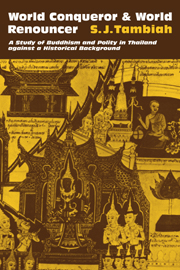 World Conqueror and World Renouncer
World Conqueror and World Renouncer Book contents
- Frontmatter
- Contents
- Acknowledgments
- PART ONE
- 1 Introduction: Reconstructing a Journey
- 2 From Rajadharma (the King's “Whole Duty”) to Dharmaraja (the “Righteous Ruler”)
- 3 The Brahmanical Theory of Society and Kingship
- 4 The Early Buddhist Conception of World Process, Dharma, and Kingship
- 5 Asoka Maurya: The Paradigm
- 6 Thai Kingship and Polity in Historical Perspective
- 7 The Galactic Polity
- 8 The Kingdom of Ayutthaya: Design and Process
- 9 Asokan and Sinhalese Traditions Concerning the Purification of the Sangha
- 10 The Sangha and the Polity: From Ayutthaya to Bangkok
- 11 The Nineteenth-Century Achievements of Religion and Sangha
- 12 The Sangha Acts of 1902, 1941, and 1963
- PART TWO
- Bibliography
- Index
11 - The Nineteenth-Century Achievements of Religion and Sangha
Published online by Cambridge University Press: 10 November 2010
- Frontmatter
- Contents
- Acknowledgments
- PART ONE
- 1 Introduction: Reconstructing a Journey
- 2 From Rajadharma (the King's “Whole Duty”) to Dharmaraja (the “Righteous Ruler”)
- 3 The Brahmanical Theory of Society and Kingship
- 4 The Early Buddhist Conception of World Process, Dharma, and Kingship
- 5 Asoka Maurya: The Paradigm
- 6 Thai Kingship and Polity in Historical Perspective
- 7 The Galactic Polity
- 8 The Kingdom of Ayutthaya: Design and Process
- 9 Asokan and Sinhalese Traditions Concerning the Purification of the Sangha
- 10 The Sangha and the Polity: From Ayutthaya to Bangkok
- 11 The Nineteenth-Century Achievements of Religion and Sangha
- 12 The Sangha Acts of 1902, 1941, and 1963
- PART TWO
- Bibliography
- Index
Summary
Converse with any educated scholar-monk in Bangkok or the provincial centers and he is likely to tell you that the wat played an important educational role in the past, a role that has diminished in the past 70 to 80 years because of the impact of Western civilization on Thailand and the consequent increasing modernization and urbanization. The more vocal and ambitious monks would say that it is time that the sangha recaptured its old role; but they will also concede that the traditional monastic education is in many ways outmoded and needs to be restructured. But this restructuring itself presents dilemmas and doubts. On the one hand, scholar-monks moan the decreasing interest of novices and monks in continuing with traditional Pali studies as such beyond a certain point. Since the minimum Pali qualification required to enter an ecclesiastical university is parian prayog 4, many young monks or novices do not feel the need to carry their Pali studies further. As a result, many traditionally famous monastic centers of education have had to contract their teaching of Pali at higher levels and to concentrate on the lower levels only (prayog 3–6). At the same time, together with a diminution of interest in higher Pali studies goes an interest in acquiring modern secular knowledge on the part of novices and monks, so that they can keep up with the times and so that, it is claimed, they can play a more vital and relevant role in modern society.
- Type
- Chapter
- Information
- World Conqueror and World RenouncerA Study of Buddhism and Polity in Thailand against a Historical Background, pp. 200 - 229Publisher: Cambridge University PressPrint publication year: 1976


